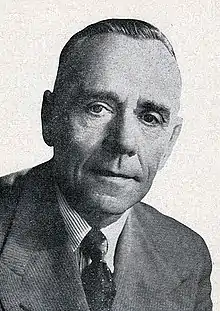Eric Louw
Eric Hendrik Louw (1890–1968) was a South African diplomat and politician. He served as the Minister of Finance from 1954 to 1956, and as the Minister of Foreign Affairs from 1955 to 1963.
Eric Hendrik Louw | |
|---|---|
 | |
| Minister of Foreign Affairs | |
| In office 1955–1963 | |
| Prime Minister | J. G. Strijdom H.F. Verwoerd |
| Preceded by | J. G. Strijdom |
| Succeeded by | Hilgard Muller |
| Minister of Finance | |
| In office 1954–1956 | |
| Prime Minister | J. G. Strijdom |
| Personal details | |
| Born | 21 November 1890 Jacobsdal, Orange Free State |
| Died | 24 June 1968 (aged 77) Cape Town, South Africa |
| Political party | National Party |
| Alma mater | Rhodes University |
| Occupation | Lawyer |
Early life
He was born in Jacobsdal in the Orange Free State on 21 November 1890 to a Boer family. He obtained a Bachelor of Arts degree at the then Victoria College, Stellenbosch. He went on to qualify as an advocate at Rhodes University College; Grahamstown, where he also practised. In 1915, when his father died at Beaufort West, he took over the business interests.
Politician and diplomat
In 1924 he was elected to the House of Assembly as MP for Beaufort West, and the following year became South Africa's first Trade Commissioner in the USA and Canada. In 1929 he became High Commissioner in London and a year later South Africa's first envoy to the United States. Louw, a republican Afrikaner nationalist had stormy relations with the British during his time as high commissioner, accounting for his short term as he was appointed high commissioner in March 1929 and had resigned by November 1929, stating it was simply impossible for him to work with British officials.[1] Louw's resignation was a great relief not only to himself, but also to the British officials who were glad to see him gone.[1]
After he had represented his country in Italy, France and Portugal and had been South Africa's first representative to the League of Nations, he returned to South Africa for political reasons. In 1938 he was again elected Member of Parliament for Beaufort West. During the Second World War he was, like most of his party, pro-Nazi. When the National Party won the general election in 1948, he was an obvious choice for the cabinet, firstly as Minister of Economic Affairs, then, from 1955, as Minister of Finance and from 1957 as Minister of Foreign Affairs. He was best known as South Africa's representative at UNO, Commonwealth and other overseas conferences. Between 1948 and 1962 he represented South Africa at UNO on eight occasions. As Minister of Foreign Affairs he assisted Dr HF Verwoerd at the historic Commonwealth conference in London in 1961 when South Africa withdrew her membership. On 31 December 1963 he relinquished his post as Minister of Foreign Affairs.
He had a major impact on Canadian relations when he met with the Prime Minister of Canada John Diefenbaker at the 1957 and 1958 Commonwealth conferences. Diefenbaker had asked Louw to give some voting privileges to coloured people (under apartheid, "colored people" were a legal category consisting of people of mixed race descent-the term "coloured people" did not refer to black people). Louw refused as he maintained that Canada did not even allow their Native population the right to vote. Louw was only partially correct; since 1876, non-status Canadian Indians who lived off the reservations had been allowed to vote and hold office, but status Indians who lived on the reservations were disfranchised. In the 1958 federal Canadian election this was an election issue and Diefenbaker passed the Canadian Bill of Right and modified the Citizenship and Indian Act to give full citizenship to status Indians in Canada. These laws were changed in 1959. These changes made it harder for Canada to say no to the forcing the expulsion/withdrawal of South Africa from the Commonwealth.
Louw was at the 1960 Commonwealth Prime Ministers' Conference on behalf of the then Prime Minister of South Africa, H.F. Verwoerd.
Honours and awards
He was awarded an honorary doctorate by the University of Pretoria in 1962. He was similarly honoured by the University of the Orange Free State in 1963. In 1965 a bronze bust of him by Hennie Potgieter was unveiled at Beaufort West in a school which bore his name until it was amalgamated with Niko Brummer Primary School in 1994. A high school in the town of Musina in Limpopo also bears his name.[2]
Death
Louw died on June 24, 1968 in Cape Town.[3]
Books and articles
- Wheeler, Tom (2005). History of the South African Department of Foreign Affairs 1927-1993. Johannesburg: South African Institute of International Affairs.
References
- Wheeler 2005, p. 21.
- "Hoërskool Eric Louw Musina Limpopo province". Archived from the original on 5 October 2011. Retrieved 16 October 2008.
- "Death of Dr Louw". The Guardian. 25 June 1968. p. 9. Retrieved 19 February 2018 – via Newspapers.com.
| Government offices | ||
|---|---|---|
| Preceded by Nicolaas Havenga |
Minister of Finance 1954–1956 |
Succeeded by Tom Naudé |
| Preceded by J. G. Strijdom as Prime Minister |
Minister of Foreign Affairs 1955–1964 |
Succeeded by Hilgard Muller |